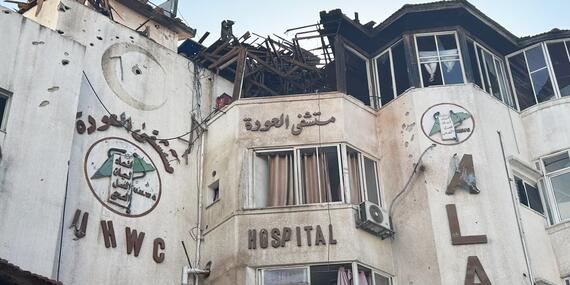Today's top news: Occupied Palestinian Territory, Haiti

Occupied Palestinian Territory
The breakdown of public order and safety in Gaza is increasingly endangering humanitarian workers and operations.
Alongside the ongoing fighting, criminal activities and the risk of theft and robbery has effectively prevented humanitarian access to critical locations.
Since 18 June, the UN has not been able to pick up supplies from Kerem Shalom crossing.
With humanitarian partners and relevant parties, we are working to address the lack of public order and safety, alongside other impediments to a meaningful humanitarian response.
As the occupying power, it is incumbent upon the Israeli authorities to restore public order and safety as far as possible and facilitate safe humanitarian access so that assistance reaches civilians in need.
In the meantime, Israeli bombardment from the air, land, and sea, as well as ground incursions and heavy fighting, continues to be reported across much of the Gaza Strip, resulting in further civilian casualties, displacement, and destruction of houses and other civilian infrastructures.
The health system in Gaza continues to be severely impacted with 70 per cent of its bed capacity lost after 9 months of hostilities. That is according to the Ministry of Health.
OCHA says that humanitarian colleagues are working relentlessly to restore key services at health facilities in northern Gaza as the health system struggles to address soaring needs amid a lack of any field hospitals in the area.
In central and southern Gaza, where the majority of Gaza’s population is now crammed in dire conditions, only seven hospitals remain functional, all partially, including three in Deir al Balah, four in Khan Younis and none in Rafah, alongside eight field hospitals.
Health partners also say that since the closure of Rafah Crossing on 7 May, all medical evacuations outside Gaza remain halted, with an estimated 2,150 critical patients unable to leave the Strip as of 20 June.
In addition to the lack of health facilities, humanitarian partners warn that the volume of medical supplies entering Gaza remains insufficient to sustain the health response.
Last week, the World Health Organization delivered its first cargo - through the Ashdod port for shipment to Gaza via Karem Shalom- with enough supplies to cover the health needs of 35,000 people. While this is a welcome development, the supplies are barely a fraction of what’s needed to sustain the massive health response.
We need a sustained flow of aid into and across Gaza, as well as unimpeded access for humanitarian operations, efforts to be able to resupply hospitals.
Haiti
The World Food programme distributed more than 76,000 meals to more than 15,000 displaced people between 15 and 19 June in Haiti's capital Port-au-Prince.
On 17 June, the third and fourth humanitarian cargo flights since May landed in the capital, transporting more than 55 tons of medicine and shelter materials for displaced people, as well as supplies ahead of the hurricane season.
Since 1 March, humanitarian partners have distributed some 21 million liters of drinking water to nearly 90,000 displaced people in the Port-au-Prince area. They also distributed 12,000 hygiene kits across 36 displacement sites.
